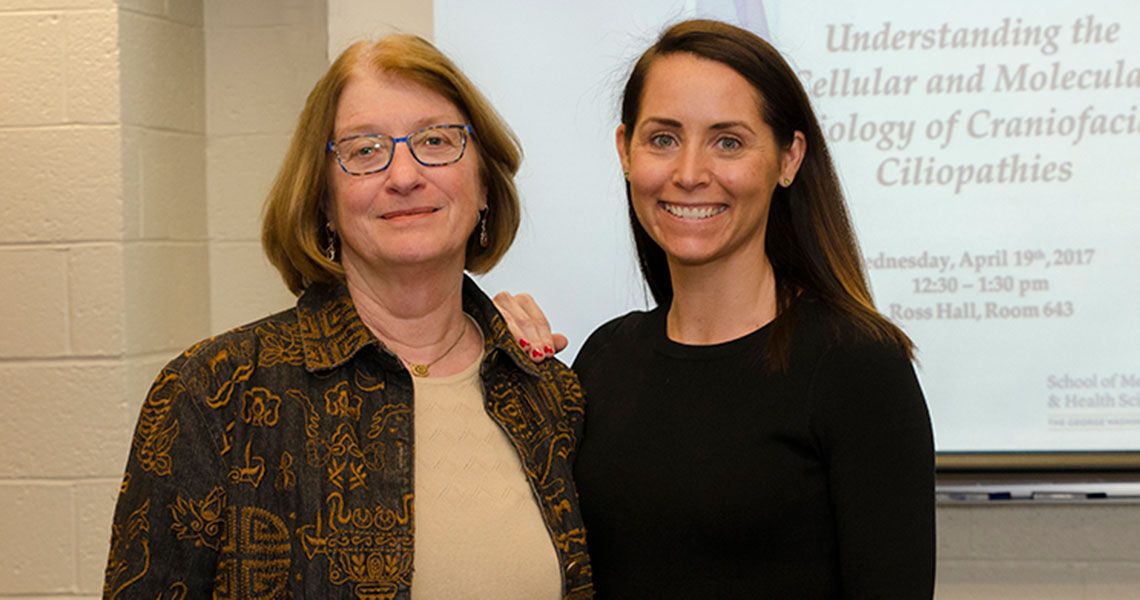Samantha Brugmann, Ph.D. ’05, associate professor in the Department of Surgery’s Division of Plastic Surgery and Department of Pediatrics’ Division of Developmental Biology within the Cincinnati Children's Hospital Medical Center, returned to the GW School of Medicine and Health Sciences (SMHS) to present a research seminar on her work, titled “Understanding the Cellular and Molecular Etiology of Craniofacial Ciliopathies,” April 19.
In 2016, Brugmann, who attended the genetics program at GW’s Institute for Biomedical Sciences (IBS), received the highest honor bestowed by the United States government to science and engineering professionals in the early stages of their research careers — the Presidential Early Career Award for Scientists and Engineers. She was one of only 105 researchers and engineers nationwide to earn the award that year.
Nominees are put forth by federal funding agencies that support their work, Sally Moody, Ph.D., interim chair of the Department of Anatomy and Regenerative Biology and professor of anatomy and regenerative biology at SMHS, said in introducing Brugmann. “Samantha has been very successful garnering NIH funding and … of the 100 people who get this award, the NIH only awarded 12,” she explained.
“I was most fortunate to have Samantha in my laboratory,” Moody added. “I am personally so proud, the Department of Anatomy and Regenerative Biology is so proud, the IBS is so proud [of Brugmann’s success].”
Brugmann’s research at the Cincinnati Children’s Hospital Medical Center focuses on craniofacial abnormalities, which comprise about a third of all birth defects.
She said her interest in ciliopathies, which are a class of disorders caused by defects in the formation or function of the cilia (tiny, hair-like structures that line surface of certain organs in the body), began with the release of a review in 2010 from Phil Beales, Ph.D., the head of Genetics and Genomic Medicine at the University College of London, and his colleagues.
“They had this review about ciliopathies, kind of a newer class of diseases; at the time there were only about 100 known ciliopathies,” Brugmann explained. “What we noticed … was that the primary organ system affected in many of these ciliopathies was the craniofacial complex, and approximately 30 percent of all ciliopathies have a craniofacial phenotype. For us, that is some type of indication that they’re playing a major role in facial development.”
Upon closer inspection of those craniofacial ciliopathies, Brugmann and her lab found a signature of the ciliopathy presentation: micrognathia, cleft lip, or cleft palate. And, in almost 60 percent of cases, there was a midfacial defect, she said. Midfacial defects historically have been hard to clinically repair and to find the genetic cause of, Brugmann added.
“So we went into this wondering if maybe a lot of these midfacial defects that we see, ‘could they be classified as ciliopathies?’ And then wanting to understand the molecular basis of the disease,” she said.
Brugmann went on explain what happens to the development of the midface when cilia are disrupted, including impacts on the Hedgehog signaling pathway, as well as what happens to the development of the jawbone when cilia are disrupted.
“I think we think of the face as this organ system that develops together,” Brugmann explained, “but what really happens is it starts with these different pieces, and each one of these different pieces is a separate developmental field, and the molecular environment in each one of these areas is completely different.”



